Is Freelance Writing Dead? What 183 Failed Pitches Taught Me About the State of Freelance Writing in 2025
Learn about the state of freelance writing in 2025 through the lens of a failed email cold pitching campaign by a decade-experienced real estate writer.
FREELANCING
Agnes A. Gaddis
9/25/202521 min read
I used to subscribe to the 'AI cannot replace you if you are good at your craft' mantra. Turns out I was dead wrong.
Here's what happened: I lost two of my major clients in the same month in March 2025.
Since then there have been 1 or 2 one-off jobs here and there. I also received an unexpected payment from one of my former clients. But I haven't really had much to do, and my finances took a hit. So in June, I started taking cold pitching seriously again.
I experimented with both Gmail and a professional email address across 183 prospects. I got a response rate of 3.75% with Gmail, and around 6.25% using G Suite. But the high response rate from the G Suite email didn't translate into much.
In fact, I did land a client through Gmail (finally!) while most other responses went something like "Thank you for your interest, but..."


The strategy was: Find websites in the real estate investing space that made at least $1.2 million per year in revenue, and had created at least a piece of content (600 words or more) over the past year. Then send out personalized pitches to someone in charge of their content or marketing.
These weren't generic email blasts. Each pitch was personalized based on personal or company history, recent achievements, or their company's recent accomplishments (major acquisition, etc.).
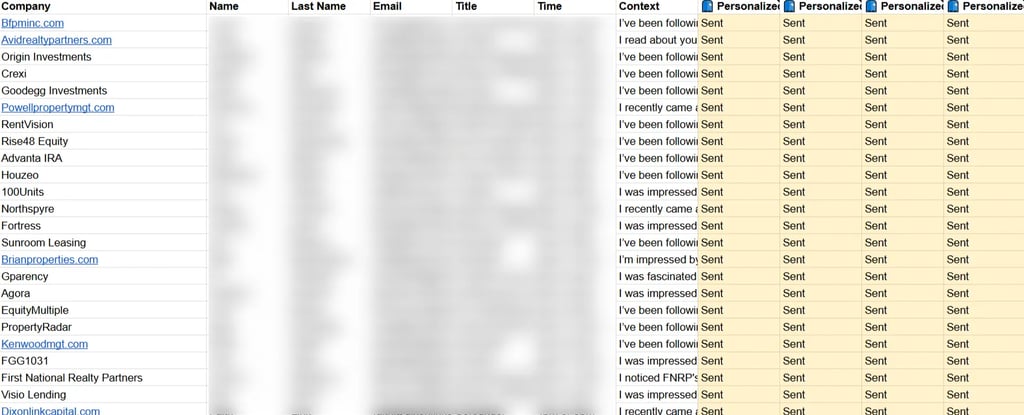

This process alone took time, about 20 minutes for each of my prospects. So I hired someone to help out with a portion of the work. Everything was ready to go within 2-3 weeks. I automated all pitches using a Mail Merge tool (this allows for more personalization).
The second follow up was just meant to offer value, without any kind of overt CTA. I was confident.
Every client I've had up until now came through cold pitching. And over the years I have had to fire clients because of low rates or poor communication because I knew with my top-notch pitching skills, I could always get a new client.
I was sure I'd land new clients within 2 weeks. Instead, I was met with silence and a few "thank you, but…" responses. It was humbling.
This experience forced me to confront the questions I'd been seeing online but brushing aside: Is freelance writing dead? Is writing dead because of AI? It certainly felt that way.
Back when I started freelance writing in 2015, skill and hard work were enough. But what I realized about freelance writing demand in 2025 is that the market has become much more saturated and competitive, and the rules have changed.
I finally understood that being efficient as a writer (meeting deadlines) and having Hemingway-level writing prowess are no longer enough. I had to learn to play by the new rules.
So how did I lose two major clients in the same month? The first major client I lost partly because the company was trying to cut costs. They hired an in-house writer while I was still working for them. I should have read the sign on the wall. The final nail in the coffin came when I raised my prices.
Oblivious to the signs, and having recently completed a course on setting freelance rates, I had a spring in my steps.
The result? Quantity of work slowly declined until zero. The other client I still work with in a limited capacity. We had disagreements over pricing (not even my new rates or standard rates).
The common thread in both cases is that clients are aggressively trying to cut or maintain costs.
Not only has freelance writing gotten incredibly competitive, demand has shrinked. Writing-related jobs dropped 21% in just eight months of ChatGPT's launch. Google's AI Overviews also devalues traditional blog content as websites lose clicks.
And with the economy currently uncertain, it's easy to see why clients are cutting their marketing budgets. For many companies, content is a discretionary expense, not a necessity. So it's not surprising to see it on the chopping block whenever times get tough. The sharp decline in Upwork freelance writing jobs is a testament to this.
Now that you clearly see the picture, here's what this article will do for you.
I'll detail my experience pitching 183 potential clients to provide an insightful exploration of the current state of freelance writing.
Then I’ll show you six things I learned (and some changes I'm making to my business); and try to answer those questions that are making you feel anxious and uncertain about the state of freelance writing. Questions like "is freelance writing dead?" and “is writing dead because of AI?” Let’s get to it!
The Truth About Today's Freelance Writing Market
After sending 183 pitches and getting no positive response, I began to wonder if my pitching failures were isolated. I started reviewing the numerous Reddit threads with topics like this.
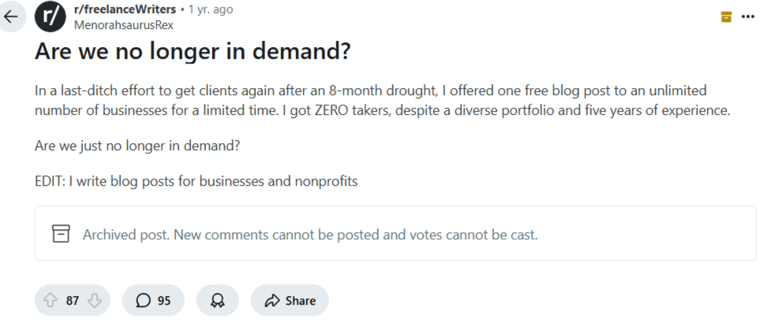

I discovered that it wasn't a "pitch" problem, rather it was a market problem. Many of those posting on Reddit were versatile, jack-of-all-trades writers, who wrote on all kinds of topics.
These freelancers had an advantage before, as they could easily find work. But now they are the easiest to replace with AI. In addition, marketing budgets have been cut and content writer job postings have declined dramatically.
To get good jobs and charge high rates today, a writer has to develop and promote a very specific set of skills that meet the increasingly narrow and specialized needs of companies in a particular sub-niche.
The numbers tell the story
According to Upwork, the freelance economy reached $1.5 trillion in revenue in 2024. However, the large number of new freelancers coming from in-house roles creates intense competition for a limited number of freelance positions.
This saturation is painfully visible on platforms like Upwork, where the sheer volume of applicants for Upwork freelance writing jobs can be overwhelming.
28% of skilled knowledge workers currently work as freelancers. Therefore, while there is some economic uncertainty, it has relatively little to do with the pressure facing the freelance sector. Market saturation is the main culprit.
Another important force putting pressure on the freelance sector is AI disruption. 78% of companies currently use generative AI on a regular basis for business tasks. The AI-assisted content creation market is expected to grow from $2.9 billion in 2024 to $3.53 billion in 2025, an increase of 21.9% in just one year.
What this means for you
Today, if you position yourself as a "content writer" or "blog writer," you're not only competing with thousands of other "blog writers," but also with AI tools. Basically, you're "commoditized."
You have to understand that your value as a writer no longer lies in your ability to write well, but in your ability to use writing as a tool to generate specific results for businesses.
Hence, you need to completely reframe your value proposition. Does your case study generate leads? Then you're not just a case study writer, you "write data-driven case studies that generate leads."
I'm not just a real estate writer. I help real estate investment companies exponentially increase their traffic and visibility through multi-platform content.
Are freelance writers still in demand?
Yes. Freelance writers are still in demand. But the problem is that while the supply of writers has increased, demand has drastically reduced due to AI. On platforms like Upwork, tasks like writing and translation, which can be easily automated, have seen demand drop by 20–50%.
Researchers say “AI acts as a force for both displacement and creation, depending on whether skills are substitutable or complementary”. So you can’t just wait for the market to return to “normal”.
AI and writing are now deeply intertwined, and AI is going to keep improving. The ground has permanently shifted under our feet as writers. The way forward is:
To upskill and offer services that AI cannot offer, or
Partner with AI and shift from “I write words” to “I deliver specific outcomes”.
Back to my 183 pitches. It failed because the “traditional” freelance writing industry is dying. I’ve been a freelance writer since 2015, and it’s never been as bad as this. But sending those pitches allowed me to reassess and re-learn. Here are six major lessons I learned.
Lesson #1: The Race to the Bottom is Real (And It's Not Just About Rates)
I raised my prices early this year. My timing was terrible, because it coincided with a major market shift - the proliferation of AI content on business websites.
Anyway, this was the beginning of the end of my work with one of my major clients. First, communication slowly declined. Whenever I followed up, they said they were redesigning their website. I had to be patient. But even after the redesign, work stopped coming in monthly, until it dried up completely.
Looking back at things now, it wasn't really about price. It was about options and their perception of value.
Many writers ask, "is freelance writing dead?" because they feel pressured to compete on price. We often fall into the mental trap of thinking cheaper prices secure clients. But it's all about perceived value and alignment. Lowering your prices is a race to the bottom.
The reality: You are not just competing with other writers
You cannot compete with AI on speed because it's exponentially faster (it's a machine). You cannot compete with it on price because it's much cheaper. This is the race to the bottom and it's a trap.
For AI blog generators like Typeface.ai, their value proposition is "write blog posts in under an hour." When your client sees these promises, your two-week turnaround for a well-researched, strategically written post suddenly feels expensive and slow.
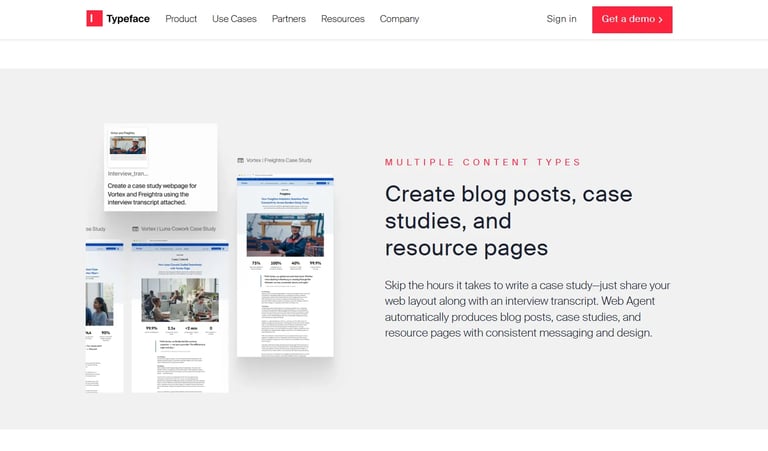

I think the big question is: what kind of blog post will you create in less than 1 hour? What value would it offer anyone except 100% regurgitated stuff? For many time-strapped business owners, it's not a question worth answering.
But as a writer, competing with AI forces you to undervalue your skills and erodes your professional standing.
Research shows most people would gladly forgo $0.85 out of every $3 to receive ChatGPT's help. That's around 28.3% of a $3 payment or $84.9 out of $300. This stat might show why CEOs and marketers wouldn't mind a decrease in profit as long as they have AI automation. It's not about maximizing value, it's about ease.
The root cause: Warped value perception
AI writing tools have distorted clients' expectations about speed, price, and quality. Some clients now expect their writers to provide 2-hr turnarounds, forgetting that quality content requires research, strategic thinking, and brand alignment.
However, the problem goes beyond AI. Marketing budgets are being slashed across industries. 59% of CMOs report having insufficient budget to execute their strategy in 2025. When marketing budgets decrease, freelance writer jobs are usually the first to go on the chopping block because their impact is harder to quantify on a simple spreadsheet.
The paradox is: Despite the drops in clicks from AI overviews, SEO and content marketing still deliver over 2X more return on ad spend than paid ads.
The big picture: Redefining human value
The takeaway from all of this is: if you seek high-value freelance writing opportunities in 2025 and beyond, you must pivot from a "writer" to a "marketer who writes."
Your survival in today's freelancing market depends on your ability to position yourself as a writer who delivers specific outcomes for clients, not just words on a page. The race to the bottom only exists if you choose to participate in it.
Lesson #2: The Illusion of "Good" Writing
After sending more than 180 personalized pitches and getting no new clients, my confidence was shaken. I felt my writing skills weren't good enough. It is easy to feel demoralized and think, "My portfolio is weak," or "I am not as good as other writers."
But I discovered I was not alone, and my writing skill was not the problem. The market itself has changed what it values.
I sent a total of 4 emails to each prospect, 1 introductory email and 3 follow-ups. In the Gmail sequence, the first email practically got zero replies, while subsequent emails got 1 or 2 replies out of probably 90+ pitches sent.
For the professional email address, the first email got the most replies (probably around 3), while subsequent emails got 1 or 2 each, making a total of 6. The last email got no replies on both ends.
I sent about 80 pitches from my professional email address. This campaign performed marginally better probably because I took the time to edit each personalized text and made it sound more natural. Yet, these replies didn’t lead to anything.
I learned that content is no longer just about artistry. It’s about achieving a specific business goal for a specific audience. The market has shifted while I stayed glued to the same spot.
Technical proficiency in writing, like strong grammar and an elegant style is no longer the measure of a writer’s worth. In 2025, the market prioritizes why we write.
Your clients (and Google) value purpose over polish
The intersection of AI and writing has made "good enough" prose a commodity; strategy is now the differentiator. To succeed as a writer, you must shift from just being a writer to being a problem-solver who uses writing as a tool.
Clients want outcomes: Does your work generate links? Does it generate leads? Does it drive high-quality traffic? Does it rank on Google and get mentions in AI search? They don’t want the most beautifully written articles; they want real results.
To stay relevant, you must master skills that align content creation with tangible business wins. The bar isn’t higher, it’s shifted already.
Lesson #3: Niche Down…Then Niche Down Again
Just niching down is not enough anymore. You have to find a sub-niche within a niche to focus on. While I have to say this goes beyond specialization—both specialized writers and generalists are feeling the heat, but AI is a better generalist.
It’s tough enough for specialized writers in this market, not to mention generalists.
Many who ask, “is freelance writing dead?” overlook the fact that the market still has room—just not for everyone. I almost landed a healthcare writing role. But I am not a healthcare writer. I could have referred someone in my network if I had someone who fit the bill.

My point is, whenever companies post freelance writer jobs, they are no longer hiring generalists. They are looking for specialist writers. And the more specialized you are, the better.
This is why going forward, I am literally focusing on creating value for residential real estate investing companies (the kinds of clients I attract) and ignoring all others. I might be able to branch out from here later on, but for me this is where I have, and can build proof.
The micro-niche revolution
In a digital world where everyone says “I can do everything,” a micro-niche freelancer says: “I only do this, and I am the best at it,” or “I only serve specific clientele and I help them achieve specific result”.
Instead of “LinkedIn ghostwriting,” think “LinkedIn ghostwriting for female tech founders.” Instead of “real estate writing,” think “brand building content for commercial real estate firms.” This hyper-specificity attracts premium clients willing to pay premium rates for expertise they can’t find elsewhere.
Freelance writing demand in 2025 and beyond is no longer about broad skills—it’s about deep, targeted expertise. This is something AI doesn’t have.
Why this strategy works
Your survival in today’s gig economy depends on becoming irreplaceable in one specific area rather than replaceable in many. Specialization is no longer a business tactic. It’s a requirement for professional survival.
The path to security and higher pay in 2025 and beyond is deep, focused specialization. You aren’t limiting your freelance writing opportunities. You compete with fewer writers, can command higher rates, and attract clients who specifically need your expertise.
The answer to the question “Is freelance writing dead?” lies in adaptation. I firmly believe that the most successful freelancers going forward will be the ones that find the sweet spot where their skills, portfolio, passions, and market demand overlap.
Lesson #4: Go Beyond Personalization, Offer Quick Wins
What I learned is that while personalization is good, if I want to land a client via cold pitching, I have to offer my prospective clients a quick win.
AI has made it easier to personalize at scale. AI tools can browse platforms like LinkedIn and help you research your prospects’ recent achievements or hiring trends.
It can even find podcasts or interviews they did or ideas they shared in a recent blog post. But personalization without tangible value is hollow.
There is no excuse for sending un-personalized emails in 2025. You know those kinds of emails everyone gets, which can be described simply as “junk”. Un-personalized emails will literally get no responses in 2025.
Yet, just proving you’ve done your homework through personalization is no longer enough to secure a client. I believe AI personalization that’s short and sweet, human-edited, and doesn’t sound too cheesy or nosy, is okay.
The most important thing is: you have to offer some immediate value that makes the person on the other end curious. That’s asking, “if I were in this person’s shoes, what quick win would I like to have right now?”
But the belief that meticulous personalization is the key to cold emailing success is wrong. While it may generate a few more non-committal replies, the time investment might not translate into clients. The ROI of hyper-personalization is too low.
The 30-minute rule
Here's the framework: If that quick win is something you can get done in 30 minutes or less, then do it, and attach it to your email.
For example, a website designer creates a 10-minute review of the prospective client’s homepage, puts that on GDrive, then links to that in their pitch.
If it takes more than 30 minutes to do, then offer to do it for free.
For example, as someone who writes, I could offer to check out their top ten posts, and optimize the meta descriptions on each to drive more clicks. I could offer to comprehensively edit and/or rewrite one of their AI content pieces.
I could offer them a subject matter expert interview/expert roundup article. I could offer a list of pages and article titles driving the most links and traffic to one of their major competitors, and give them a quick analysis of each page to show why each of those pieces works.
The quick win might also be inherent in your offer. For example, you could provide a presentation that breaks down your process for helping them achieve something that makes their life easier.
But make sure what you offer is something that makes the person at the other end curious. Don’t just offer “a free audit of XYZ.”
The psychology behind it
The way to reach people nowadays is offering them something that makes them look good. You’re giving them something they can use to impress their boss or something that will improve their life in some way.
Everyone is threatened by AI, even marketing directors. So you have to shift the entire focus from your own needs as a freelancer to addressing the professional anxieties and goals of your potential client.
This taps into the principle of reciprocity—when someone provides value first, people feel obligated to return the favor.
Cold emails have a response rate between 1% and 5%. Personalization alone will get you nowhere. It takes more than that to get people’s attention nowadays. If you want to cut through the noise, you should be generous enough to empower your prospects with your skills or your unique insights.
Lesson #5: Commit to Learning. Become an Expert at Something Else Besides Writing
If all you can offer is content writing, then you had better be looking for a 9-5 right now. “Content writer” with no additional skills is no longer a sustainable career path.
Right after I sent out the first 90+ pitches and didn’t get a response, I thought my pitches needed some tweaks.
This was when I had to switch to a professional email, and make my personalizations more human. But after sending all 183 pitches and follow-ups and getting no new clients, I realized the problem wasn’t my pitch. It was the market itself.
Yes, sending 183 pitches isn't enough to definitively answer the question, "is freelance writing dead?" But it helped me realize that the freelance writing profession has reached a critical inflection point where simply being a good writer is not enough.
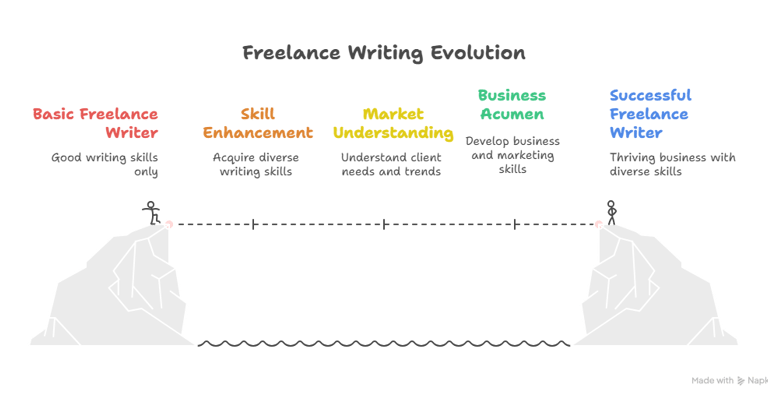

The T-shaped marketer
Writing, in combination with another skill, allows you to sell results, not just a service. This is the way forward.
I realized that to thrive going forward, I must become a “T-shaped marketer”.
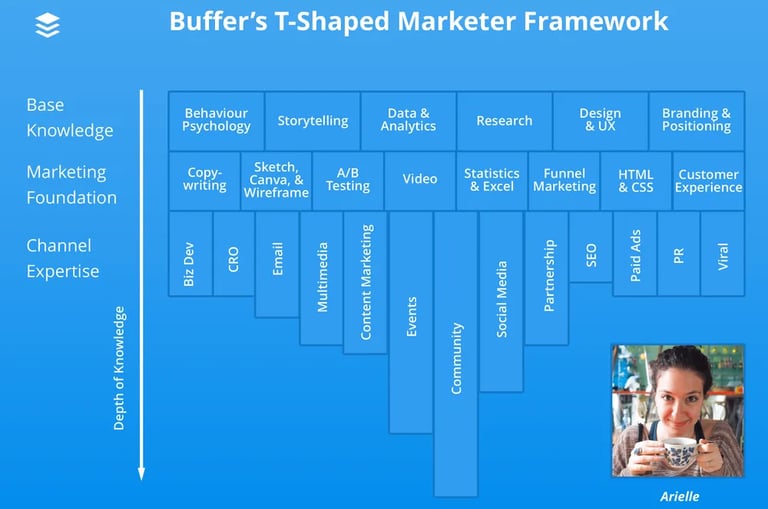

I discovered that I needed to combine my deep expertise in storytelling and communication with functional knowledge of related marketing disciplines like Google Analytics, Generative Engine Optimization (GEO), lead generation, AI video creation, social media marketing, and Google Ads.
My strategic content repositioning
The most durable strategy for a writer is to become an orchestrator of a complex process that drives results, and that AI cannot replicate (at least not on its own).
Writers also need to proactively measure results, and be inquisitive about the results clients are getting from their work.
Here’s what I figured out: Most AI tools scrape information from websites on the first pages of Google and Bing. So getting mentions and links within these websites boosts your rankings and your chances of appearing in AI search answers.
With my knowledge of guest posting and multi-platform content creation, I pivoted to helping clients skyrocket their visibility by creating multi-platform content—not just articles, but social media content and sometimes, email newsletter content—combined with guest posts on high-authority sites.
That is, each content piece gets repurposed into 16+ pieces for multi-platform marketing.
Then we can skyrocket mentions through targeted guest blogging. This whole process is something AI cannot do (not alone at least).
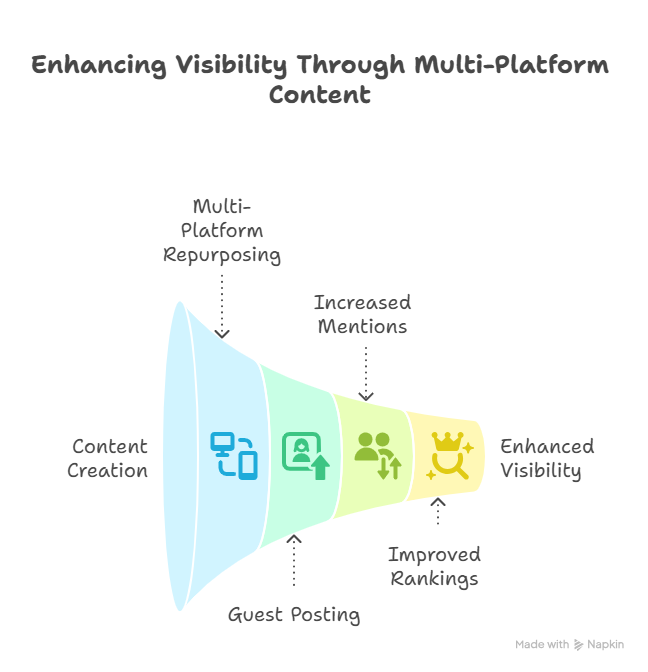

It’s the opposite of what’s happening with fully automated AI blog content. Many marketers and CEOs feel AI content should be sufficient to move them from Point A to Point B. They see traffic increasing because, by having more pages, more people view their sites.
The problem is, and this keeps being reported by business owners, that traffic is useless. It's not converting.
People just view the page, probably because of the catchy headline, and once they notice the content is shallow and not written by a human, they leave.
After a while, traffic starts plummeting because Google takes the cue, and they see traffic drop to zero for many pages.
But these business owners keep creating more pages, since it's automated, creating this self-deprecating cycle, and hurting their businesses.
I have nothing against AI content. I use AI in my content processes myself. But I dislike unedited or slightly edited AI content. What it says to me is: "I have put no thought into this". And I'm sure I'm not the only one who feels this way.
Human-written content hasn't been perfect either. And it hasn't been perfect since SEO agencies and content farms started hiring people who could create content for 5 bucks and generalists who talk a big game.
The question, "is freelance writing dead?" becomes clearer when you look at the content formats that are losing value.
Content formats like the run-of-the-mill affiliate's long-list articles, news articles (that aren't novel), how-to articles (that aren't customer-specific), comparison-type articles and listicles (that aren't branded or spotlighting the brand), what is articles, pillar page, skyscraper content, and the likes have been hurt by Google's AI Overviews.
So content creators and marketers need to be very strategic about what they choose to work on right now, and also must spread out beyond Google.
So what types of content should I create?
Original research and stats-based content will always be in vogue. When it comes to stats, people do not trust AI, and most times they want to see the full picture. So that drives click throughs.
AI can't write case studies. It can write formulaic case studies, but not the kind of story-based case studies that move the needle.
AI can't do subject matter interviews. So it can't write subject matter interview/expert roundup articles.
AI can't write ICP-specific content. It can write generic content based on what it scrapes from the web. But for those kinds of articles where SEO isn't the priority, but reaching a specific target customer, AI can only reach surface-level.
AI doesn't understand your brand and can't deep dive into your value proposition like a human can. While it can write any kind of comparison article and listicle, it can't write those listicles and comparison posts that spotlight your brand, and make customers choose you over your competitor.
AI also can't write documentation posts like this one. The kind that spotlights your wins and losses or that delves into your personal experiences.
AI can assist you when writing these kinds of posts. But these are not the kind of articles you "generate". These are the kind of articles I'm talking about when I say "strategic content".
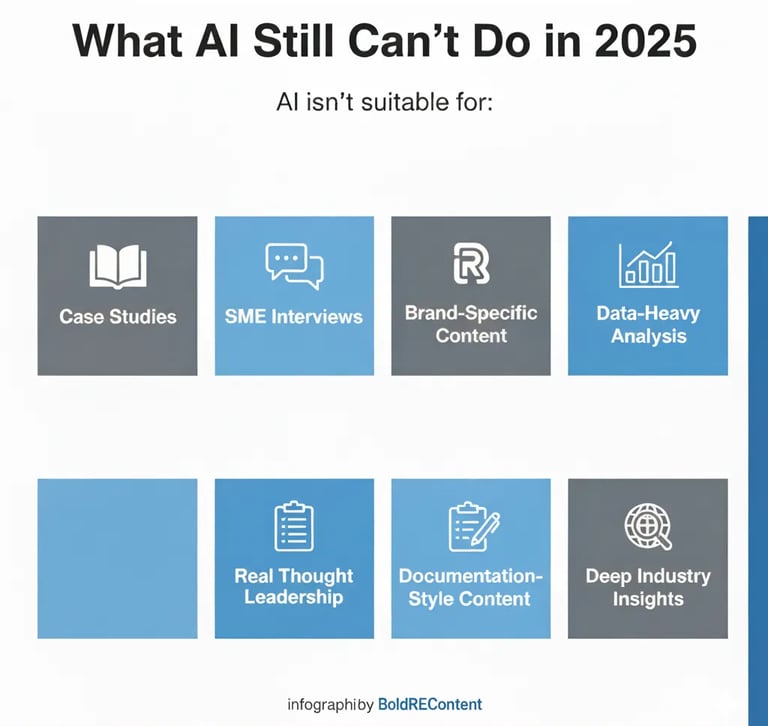

The reality check
The writing profession’s low barrier to entry made it vulnerable to disruption. Anybody could create a LinkedIn profile and call themselves a freelance writer. This made it the easiest place for AI to penetrate.
Today’s writers have a new job description: Move clients from Point A to Point B. Your survival and success depend not on lowering prices or getting another writing certification, but on using your writing to create measurable progress and solve real problems for clients.
Lesson #6: Do Not Make Money Your Motivation. It Should Be All About Value Creation and Growth
A lot of freelancers are desperate right now. I was there too (although I have recurring monthly projects now). But at the start of my pitching campaign, I was focused on just one thing: getting a new client.
That desperation showed in my follow-ups, which stopped offering any real value. That campaign almost turned into a complete disaster, because I had forgotten one simple truth: people pay for solutions, not for your time or skills.
No one owes anyone attention. I had to shift my thinking from this desperate, short-term focus on making money, to a craftsman mindset.
In Cal Newport's book, "So Good They Can't Ignore You," he introduces the "Craftsman Mindset." This means focusing on building rare and valuable skills versus the compensation you get from doing your job or what you want from your career.
If you build skills that help clients solve real problems, you gain leverage, and can subsequently progress faster in your career.
Taking the same mindset to marketing, it becomes what Seth Godin describes in "This is Marketing" as the "generous act of helping others solve problems." If I generously create value for others through my work, I build the kind of "career capital" that leads to better opportunities and financial stability.
In a market with more supply than demand, lowering your prices is a race to the bottom. The only winning move is to raise your perceived value by becoming more valuable.
This AI wave is an opportunity to prioritize upskilling. You have to think five to ten years ahead and ask: What skills would make me more valuable? What kind of value can I create for my clients that AI cannot replicate in the next five years? Your future career and financial stability depend on you starting to learn those skills now.
So, is AI replacing freelancers?
Yes, it is. This is the reality. It's replacing freelancers at all levels. And I was one of those who said it would only replace generalists.
In fact, research from the Brookings Institution revealed that AI job displacement was more pronounced among experienced, specialized freelancers who offered higher quality services and charged premium prices.
So beyond having a niche or sub-niche, you might have to critically examine whether the services you currently offer your clients are defensible and difficult to replicate with AI.
If they aren’t, you need to sell results by bundling services together or pivot to services that rely on human strengths and real human interactions.
The Full Circle: We're Not Competing with AI—We're Competing with Fear
After 183 pitches, countless hours of perfecting my approach, and watching my freelance writing career stall, I finally understood the problem. I wasn't competing with AI tools, I was competing with fear—my own fear and my clients' fear.
Let me explain. My own fear led to desperate follow-ups, while my clients’ fear makes them want to keep up with the Joneses. It makes them hesitant to invest in quality content and retreat to what feels safe, even if it’s not the best option.
If I confront and shed this fear, I win. It goes beyond Google's algorithm changes. I have to dismantle my own self-doubt and the anxiety that holds me back from growth. I have to recognize the current situation for what it is: an opportunity for growth.
Why “proving you’re better than AI” is the wrong fight
When one company tried replacing 1,000 human jobs with AI, they discovered something surprising: AI could solve approximately 15% of tasks, but they made exactly $0.
The mistake lies in viewing tools like ChatGPT as direct rivals. You excel where AI fails. It can’t understand context, build and nurture relationships, or solve strategic problems.
Yet here I was, trying to prove my writing was “better” than ChatGPT. This is like a chef trying to prove they are better than a microwave. You are solving completely different problems.
What does success actually look like now?
In “This is Marketing”, Seth Godin notes that marketing is about understanding what people want to become and helping them get there. The path to success for us writers in 2025 and beyond, is to fundamentally change the game we are playing.
Successful freelancers today are not fighting AI. They are solving different problems entirely.
They are conducting industry research that requires human judgment. They are interviewing subject matter experts and translating complex ideas into compelling narratives. They are developing brand positioning that resonates with specific audiences. They are creating content strategies that actually take businesses from Point A to Point B.
They aren’t trying to out-write AI or just producing content. They focus on delivering tangible outcomes to clients.
Whether it’s with the help of AI or not, if your work measurably contributes to helping a business achieve its goals, you become a strategic partner. You no longer compete on speed and cost. This is the way! This is what success looks like now.
So, is freelance writing dead? Only for those who refuse to play this new game.


Agnes Gaddis is an experienced real estate content writer, helping residential real estate investing brands boost traffic and visibility through content. You can read her articles on SparkRental, Inman, Bankrate, RealWealth, Credit.com, and more.


